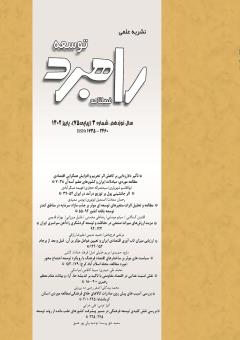سیاست¬های موثر بر ساختارهای اقتصاد ِفرهنگ با رویکرد توسعه¬اجتماع¬محور (مورد مطالعه، محله اسلام¬آباد کرج)
محورهای موضوعی :محمّد¬تقی¬ حیدری 1 , سیما کاظمی 2
1 - 0
2 - دانشگاه زنجان
کلید واژه: واژه¬های کلیدی: محله, اقتصادِ فرهنگ, رویکرد اجتماع¬محور, صنایع خلاق, محله مرادآب کرج(اسلام¬آباد),
چکیده مقاله :
چكيده رشدفزاینده شهرنشینی و نبود مدیریت¬منسجم¬شهری منجر به ناکارامدی برنامه¬ریزی¬در شهرها شده، به¬طوری¬که این ناکارامدی¬درسطح خُرد«محله¬ای» بیشتر نمایان است. بطورکلی نگرش مبتنی بر اجتماع در توسعه¬شهری و برنامه¬ریزی می¬تواند باعث افزایش کنترل مردم بر زندگی¬و معیشت خودشان گردد و نهایتا باعث ارائه طرح¬ها و برنامه¬هایی¬شود که با نیازها و شرایط¬محلی همخوانی بیشتری دارد. در علم اقتصادِفرهنگ، به زمینه¬هاوبسترهای اقتصادی مورد نیاز در یک مقوله-فرهنگی پرداخته می¬شود. تعیین سیاستهای صحیح در حوزه و بخشهای اقتصادِ¬فرهنگ؛ از مهمترین وکلیدیترین عوامل توسعۀ آن¬است. دراین¬راستا در پژوهش¬حاضر؛ سیاست¬های¬موثر در اقتصادفرهنگ در محله مرادآب¬کرج(اسلام¬آباد) با رویکرد محله¬مبنا با روش توصیفی- تحلیلی مبتنی بر منابع اسنادي و پیمایشی تدوین شده است. ابتدا مبادرت به بررسي وتبيين ماهيت اقتصاد-فرهنگ و نقش صنایع¬خلاق و سیاست¬های موثر بر اقتصادفرهنگ خواهيم پرداخت و در نهايت راهكارهايي راهبردي-اجرايي در راستاي رسيدن به توسعه¬محله¬¬¬مبنا ارائه شده¬است. داده¬های مورداستفاده در این پژوهش به روش ترکیبي(کمي وکیفی) است. تجزیه و تحلیل اطلاعات با توجه به شیوه توصیفی تحلیلی و با توجه به استنباط¬های نظری صورت گرفته است. جامعه¬آماري این تحقیق را کارشناسان و صاحب¬نظران در زمینه شهرسازي و بخشی هم توسط افراد بومی محله تشکیل می¬دهند به منظور شناخت عمیق¬تر مسائل و مشکلات به¬ویژه شناخت ویژگی¬های اجتماعي و اقتصادی با استفاده از روش پیمایشی¬و¬ابزار پرسشنامه به گردآوری اطلاعات اقدام شد. پس¬از احصا شدن نظرات¬و¬پاسخ¬ها از روش تجزیه وتحلیل محتوا و به طور خاص از نرم افزار (MAXQDA) استفاده¬گردیدکه از آن¬طریق داده¬های پاسخ¬های مصاحبات و پرسشنامه¬ها خلاصه¬سازی و کدگزاری گردید. نتایج،گویای آن است¬که شورای¬محله و مدیریت¬شهری با تغییر بنیادی ساختارهای برنامه¬ریزی محله می¬توانند به پایداری اکولوژیک، اقتصادی، اجتماعی، سیاسی و فرهنگی¬محله در راستای توسعه¬پایدار محله¬ای کمک شایان توجهی نمایند. درنهایت می¬توان گفت مدیریت منسجم محله¬ای، در شکل¬گیری محله و حفظ ساز و کار اقتصادی محله و همچنین صنایع خلاق نقش بسزایی دارد.
Mohammad Taghi Heydari Sima Kazemi Lemraski Abstract The increasing growth of urbanization and the lack of coherent urban management have led to the inefficiency of planning in cities, so that this inefficiency is more visible at the small "neighborhood" level. In general, the community-based approach in urban development and planning can increase people's control over their own lives and livelihoods, and ultimately lead to the presentation of plans and programs that are more consistent with local needs and conditions. In the science of cultural economics, the economic fields and Websters needed in a cultural category are discussed. Determining the correct policies in the field and sectors of the economy of culture is one of the most important and key factors in its development. In this regard, in the present research; Effective policies in cultural economy in Moradab-Karaj neighborhood (Islam-Abad) have been compiled with a neighborhood-based approach with a descriptive-analytical method based on documentary and survey sources. First, we will examine and explain the nature of the cultural economy and the role of creative industries and effective policies on the cultural economy, and finally, strategic-executive solutions are presented in order to achieve the development of the neighborhood. The data used in this research is a combined method (quantitative and qualitative). Data analysis has been done according to the analytical descriptive method and according to theoretical inferences. The statistical community of this research is made up of experts and experts in the field of urban planning and some of them are native people of the neighborhood. In order to get a deeper understanding of issues and problems, especially social and economic characteristics, information was collected using a survey method and a questionnaire tool. After the comments and answers were counted, the content analysis method was used, and in particular, the software (MAXQDA) was used, through which the data of the answers to the interviews and questionnaires were summarized and coded. The results show that the neighborhood council and city-management can contribute to the ecological, economic, social, political and cultural sustainability of the neighborhood in the direction of sustainable neighborhood development by fundamentally changing the neighborhood's planning structures. Finally, it can be said that coherent neighborhood management plays a significant role in shaping the neighborhood and maintaining the economic structure of the neighborhood as well as creative industries.
